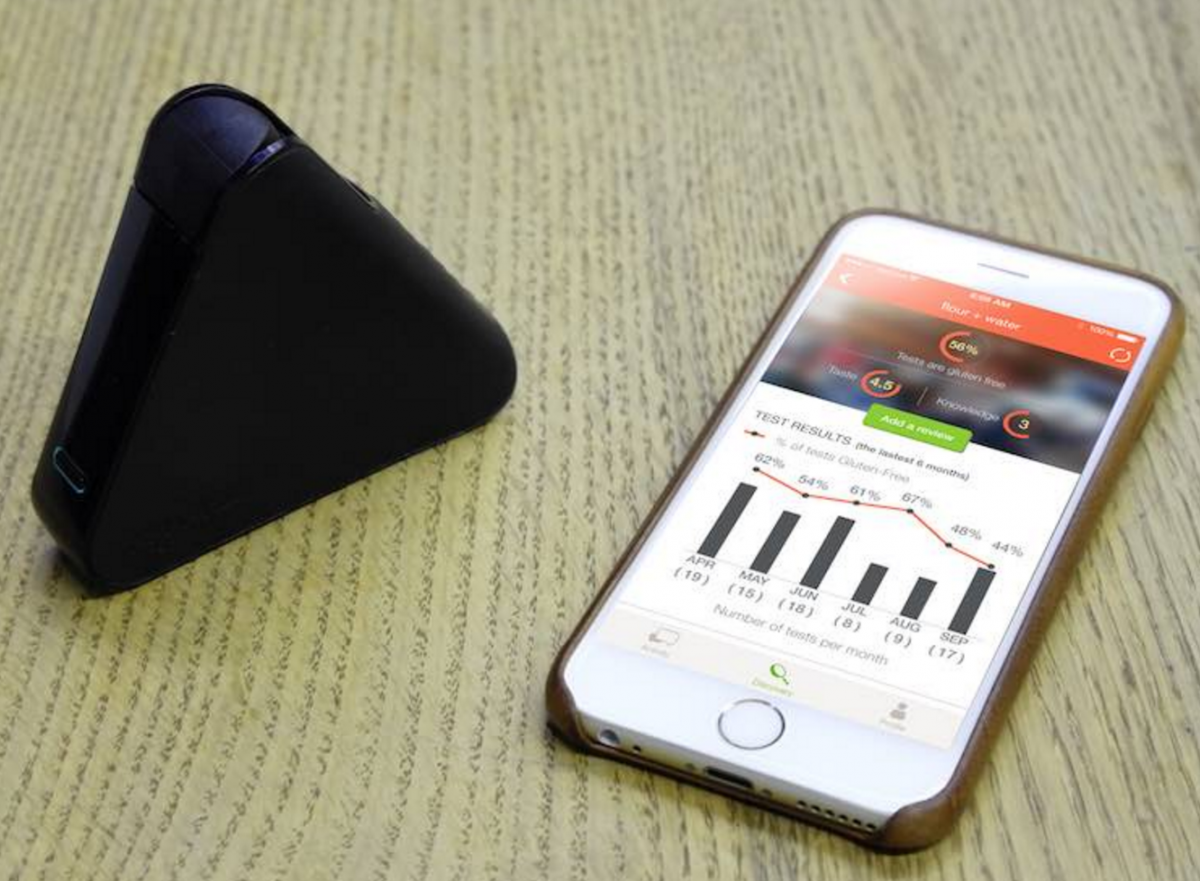 Gluten-free foods – and awareness of sensitivities and allergies – are so commonplace these days that it seems people with such dietary needs shouldn’t have a problem knowing whether food will trigger a reaction or not. But gluten, the protein found in wheat and related grains, abounds in sneaky ways, like in sauce or on restaurant dishes, and even when people try to go out of their way to avoid it, they might end up eating it.
Gluten-free foods – and awareness of sensitivities and allergies – are so commonplace these days that it seems people with such dietary needs shouldn’t have a problem knowing whether food will trigger a reaction or not. But gluten, the protein found in wheat and related grains, abounds in sneaky ways, like in sauce or on restaurant dishes, and even when people try to go out of their way to avoid it, they might end up eating it.
Which is why San Francisco-based startup Nima Labs (formerly known as 6SensorLabs) developed a portable gluten sensor that people can take with them anywhere and discreetly test morsel of their food. Using Nima, a small, triangular-shaped, chemistry-based sensor and companion app, users can detect gluten down to 20 parts per million, which is the FDA classification for gluten-free products. Three years in the making, the device will be available to consumers within the next few weeks.
“It takes one 200th of a teaspoon to trigger a reaction in people who have a problem with gluten,” Shireen Yates, cofounder and CEO of Nima told MobiHealthNews in an interview. “We want people to be able to understand, right on the spot, what they are putting in their body.”
The company was founded in 2013 and has 20 employees whose expertise spans chemistry, coding and engineering (mechanical, electrical and chemical) from the likes of MIT, Stanford, Google and Dow Chemical. The impetus for Nima came from Yates’ own struggles with food sensitivities, and her team is built up of people with similar issues. They went to work on developing a solution that would integrate chemistry, engineering and software so people could truly know what was gluten free.
“It’s in a lot of things you don’t know,” said Yates. “When we were doing consumer feedback, we found that one out of three people were getting sick outside of the home, and then when we started doing food testing on all these supposed gluten-free labeled menu items, and something like 20 to 30 percent were coming up positive.”
The goal isn’t to be the Epi-Pen of gluten detection, and as of now Nima isn’t seeking FDA clearance as a medical device. It isn’t even trying to be just for people with serious gluten aversions such as celiac disease, or even those with gluten allergies.
“Whatever your reason is for avoiding a food, we don’t question it. We just want to give you that information,” said Yates. “And the only way to do this reliably and accurately is through chemistry.”
Nima’s chemistry-based sensor comes with disposable cartridges about the size of a roll of film, which users load with a pea-sized sample of food. Once the cartridge is screwed shut, the device grinds the food, and the mixture is released to a test strip that is analyzed by sensors. After about two minutes, a small screen on the front of the device will display either a happy face (gluten free), or a wheat icon and text that reads “gluten found.” Using the companion app, users can create a network with others and establish a rating-based system map of restaurants, cafes and stores where gluten-free foods can be found.
“We think about every test as a potential data point,” said Yates. “The value of this is creating a whole map of testing that goes behind the menu item, goes beyond the nutrition label that we don’t really have access to.”
Making Nima wasn’t easy. The chemical sensors – based on food industry gold-standard validation tests – took the longest to develop. Asked about how many versions Nima has been through, Yates said simply, “So many.”
“We’ve been through a lot of iterations, because we wanted to be sure to get everything right,” said Yates, who herself has done hundreds of tests. Nima has been running a proto campaign the past year, with plenty of beta testers and feedback, and the company sees the consumer launch this year as the beginning of many potential partnerships to come.
“We have a lot of ideas for where this can go – getting it into restaurant kitchen so the back of the house staff can test it, layering the data on restaurant reviews, creating a 'Nima-certified' label … we have a lot of plans,” said Yates.
Nima Labs has had three rounds of funding, with the most recent round in May wherein they raised $9.2 million in a Series A round led by the Foundry Group. The company's total funding to date is $14 million, and they will use funds to further expand their device.
And they aren’t stopping at gluten. Nima is also currently developing a peanut and dairy detector, and plans to scale up to a number of reaction-triggering foods like soy, tree nuts, shellfish and other proteins.
“We want to get to the point where you can test for anything,” said Yates. But even testing every item on a plate wouldn't be foolproof.
“We’re not guaranteeing your whole plate is free, just that one sample,” she said. “But that one sample is one data point that you didn't have before today.”

















